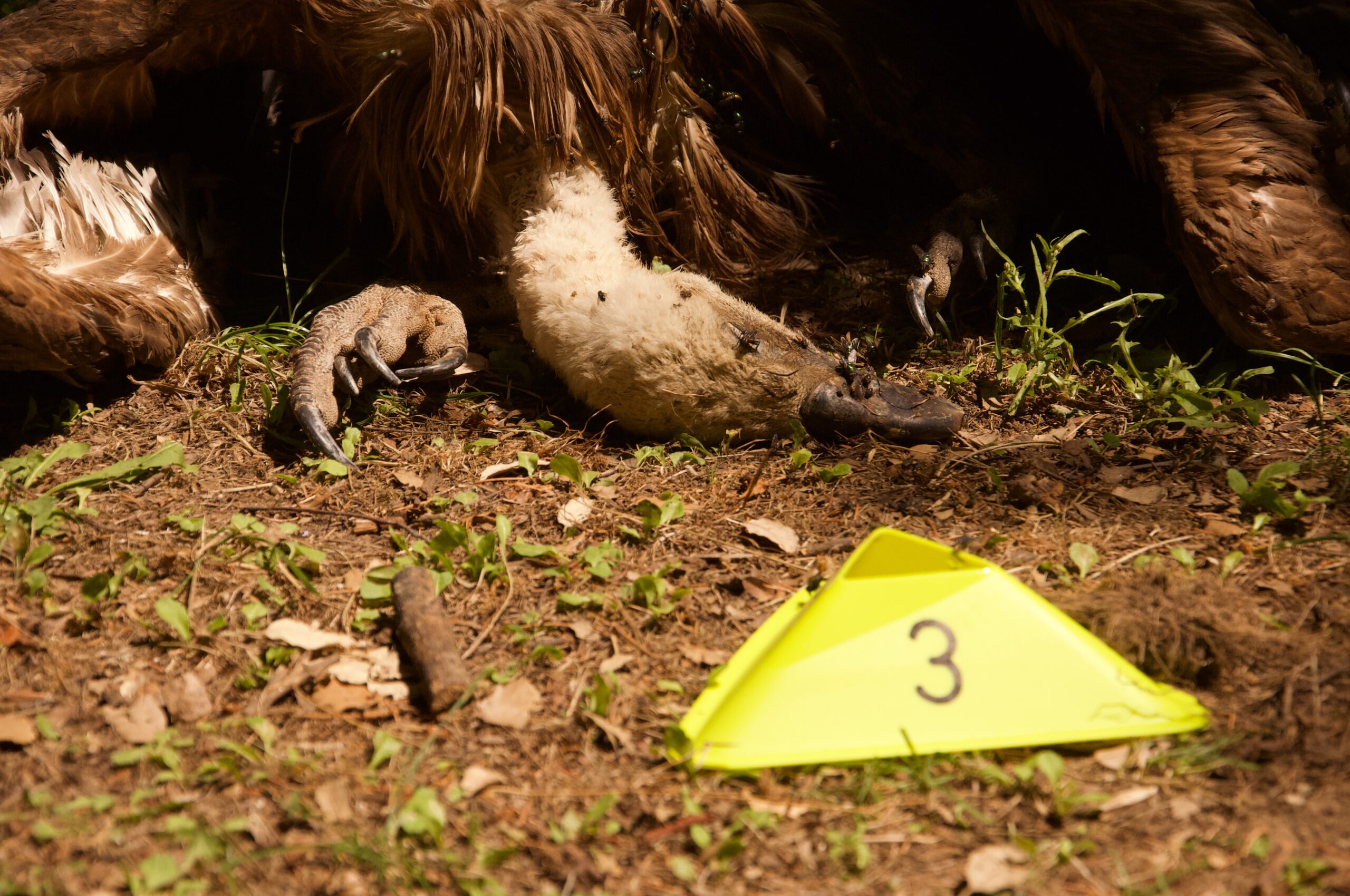
It has been years since vultures have been poisoned in the Dadia-Lefkimi-Soufli Forest National Park, Greece, but this illegal and harmful practice kills yet again. Two Cinereous Vultures, members of the only remaining breeding colony of the species in the Balkans, lost their lives due to the recent wildlife poisoning incident that transpired at the National Park. In addition to the vultures, one Greater Spotted Eagle and a wild cat were also poisoned to death.
Detection of the poisoning incident at Dadia
During the last weekend, staff from the Management Body of the Dadia-Lefkimi-Soufli Forest National Park alongside WWF Greece‘s poison-bait detection unit discovered the carcasses of several protected animals. They investigated the scene after receiving worrying GPS data from one of the two Cinereous Vultures found dead, as he was tagged within the LIFE Re-Vultures project. Kiko, the specially trained dog, scattered the area and discovered the suspected poisoned animal used as bait that was consumed by the scavengers.

Kiko also found the carcasses of the Greater Spotted Eagle and the wild cat as well as a spot with many dead insects and hairs. The staff who responded to the incident widely searched the area and will continue to do so in the coming days to potentially locate any additional victims. So far, based on the evidence, it appears that the animals instantly died after consuming poison baits placed in an agroforestry area between Kornofolia and Dadia.
Launch of an investigation
The use of poisoned baits poses a significant threat to nature, wildlife and public health. This practice is also illegal and prosecuted. To thoroughly investigate the incident, the competent teams carefully collected samples from the carcasses. They then sent them to the local Veterinary Service to perform toxicological analyses, identify the toxic substance used and determine its origin. In addition, the Soufli Forest Service will immediately start the pre-investigation in accordance with the “Local Action Plan to Combat the Illegal Use of Poisoned Baits” and, in cooperation with the relevant bodies, will take all possible action to locate the perpetrators.
Adverse consequences on local Cinereous Vulture colony
Today, the Dadia-Lefkimi-Soufli Forest National Park, in Greece, hosts the only Cinereous Vulture breeding population in the whole of the Balkan Peninsula. There are currently 30-35 breeding pairs and about 130 individuals in Dadia. This incident caused a huge blow to the endangered population of the Cinereous Vulture in the country, as “Marios” and “Vangelis”, the birds found dead, were nesting in two different nests, resulting in the loss of two pairs from the only 30-35 recorded in recent years. The president of the Management Body, Konstantinos Poirazidis, stated that “it is inconceivable, after decades of efforts for the recovery of the only Cinereous Vulture population in the Balkans, that such incidents are still being recorded, even within the National Park.”
We hope the investigation will be successful, and the perpetrator(s) responsible will be brought to justice for the irreparable damages they have caused to nature!
Cinereous Vultures in the Balkans

Once a common sight in the Balkans until the 1930s, the population of Europe’s largest vulture declined steadily until the species was declared extinct across most countries in the region in the 1980s, with only a small population of 30-35 pairs remaining in Greece’s Dadia National Park. Despite the proximity to the colony in Greece, the species is not thought to have bred in Bulgaria, or any other Balkan state for decades. There are currently several conservation actions aiming to boost the Cinereous Vulture population in the Balkan Peninsula.
The LIFE Re-Vultures project aims to recover and further expand the Cinereous and Griffon Vulture populations in the cross-border Rhodope Mountains, mainly by improving natural prey availability and reducing mortality factors such as poaching, poisoning, electrocution and collision with power lines. Cinereous Vultures that breed in Dadia Forest in Greece forage in Bulgaria and Griffon Vultures that breed in Bulgaria feed in Greece.
Furthermore, the Vultures Back To LIFE project now works to establish a nesting population of the species by tackling main threats and releasing Cinereous Vultures to key areas in the wild. The goal is to restore the connections between the sub-populations of this species in the Balkans (Greece), Crimea, the Alps and the Iberian Peninsula. So far, the population of the species is gradually increasing, with the first pair officially formed in 2020 by two reintroduced vultures since the species extinction in Bulgaria.
Finally, to protect vultures and other wildlife from illegal wildlife poisoning, the new BalkanDetox LIFE project, led by the Vulture Conservation Foundation (VCF) and funded by the EU’s LIFE Programme, aims to minimize the scale and scope of this damaging practice by raising awareness and building capacities among key stakeholders across seven Balkan countries.




